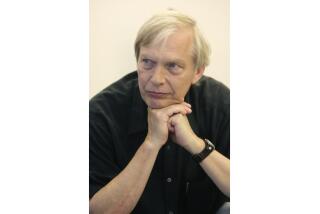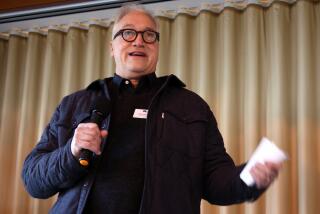Not Business as Usual at NPR : New Chief Delano E. Lewis Wants to Expand Financial Base, Cut Costs
WASHINGTON â The sixth-floor office of Delano E. Lewis, the president of National Public Radio, is eerily quiet for a room surrounded by a new multimillion-dollar broadcast facility that boasts a half dozen satellite dishes and the largest recording studio between New York and Nashville.
Thatâs because Lewis mostly listens to NPR at home or during commutes. At work he turns off his office stereo system in order to devote himself to reinventing the public-radio network, which broadcasts such acclaimed programs as âMorning Editionâ and âAll Things Considered.â
âI find it difficult to work and listen to radio,â explained Lewis, who took over NPR in January after serving as president of the local Washington metropolitan area telephone company, Chesapeake & Potomac Telephone. âI come from a very different kind of cultural environment. . . . You have to understand I had been in a business hierarchy for 21 years. But we have people around here that keep the radio on all day.â
A clash of cultures is unfolding at National Public Radio, where Lewis is trying to infuse the non-commercial radio network with entrepreneurial fever in order to stem the challenge of dwindling financial resources and inroads made by American Public Radio, an upstart nonprofit radio network based in Minneapolis.
Lewis has vowed to fight back by broadening NPRâs audience with more diverse programming and by making more shows pay for themselves on a network that has been described as the champagne of radio and also, less charitably, by the Washington City Paper as âa house organ . . . for aging yuppies.â
âI want to bring to the table some business principles so that we can become more efficient,â said Lewis, a 54-year-old lawyer. âIâd like to see us use other revenue streams (by) marketing and selling our programs. . . . I donât intend to make public radio a commercial, for-profit organization. But I do believe there are ways in which we can operate that will save us money.â
*
NPR executives, weaned on the financial largess of Congress as well as public and private grants, say they are resigned to a more competitive broadcasting environment and are intrigued by Lewisâ ideas. Yet they remain circumspect about a former business executive whose commitment to the Bohemian, sometimes self-indulgent world of public radio hasnât been fully tested.
âHeâs very charismatic and heâs said a lot of the right things and pushed the right buttons,â said one high-ranking NPR official who did not want to be identified. But in general, the official said, people are taking a wait-and-see attitude. And if it turns out they donât like what they see, the official said, some staff members are taking solace in the belief that NPRâs board of directors wonât let Lewis âget too far out of lineâ in his effort to make NPR more entrepreneurial and businesslike.
With his extensive ties to Washingtonâs political, business and arts establishment, however, Lewis is a man to be reckoned with, friends and supporters say.
âHeâs just an excellent motivator of people and a consensus builder,â said Bob Johnson, the chief executive officer of Black Entertainment Television. And with a long history of charity work on behalf of such groups as the United Negro College Fund and the Capital Childrenâs Museum, Lewis knows the right sources to tap to broaden NPRâs financial base, Johnson said.
A native of Kansas, Lewis attended the University of Kansas and the Washburn School of Law and was an early supporter of Bill Clintonâs presidential bid. Lewis himself had been repeatedly courted to run for a variety of Washington political posts.
After brief stints as a Justice department lawyer, Peace Corps worker and congressional aid, he joined C&P; Telephone in 1973 and rose through the ranks to become one of the nationâs highest-ranking African American phone executives. In addition to recently being appointed to co-chair the Clinton Administrationâs blue-ribbon National Information Infrastructure Advisory Council, Lewis serves on several corporate boards.
But observers say Lewisâ corporate background is of little distinction at NPR, which has long prided itself as a high-brow alternative to commercial broadcasting.
âFor years, commerce has been a dirty word in public broadcasting,â observed Laurence Jarvik, director of the Washington office of the conservative Center for the Study of Popular Culture. âBut Lewis is a guy who does not say nasty things about business. I think heâs going to run into resistance because he is not openly resistant to commerce and because he is a very, very powerful black manâ in an organization traditionally dominated by white males.
In an effort to lessen NPRâs reliance on gifts and grants from the congressionally supported Corporation for Public Broadcasting, Lewis wants to form a subsidiary to market NPR programs on CD-ROM computer disks. And NPR, which is seeking to forge financial tie-ins between NPR consumer shows and their related industries, has already signed up General Motors Corp. subsidiary Saturn Corp. as one of the underwriters of the show âCar Talk.â Lewis is also soliciting ideas from his 400-member staff on ways to cut waste and inefficiency at NPR, which has an annual operating budget of nearly $47 million, about 67% of which comes from the networkâs 500 member stations.
*
Lewisâ ambitious plans, however, could leave NPR even more open to criticism that it allows corporate interests to dictate programming and news coverage.
In an awkward moment during the taping of âCar Talkâ last month in San Antonio, an audience member asked one of the showâs hosts, Tom Magliozzi, what kind of car she should buy. The question came just after Lewis, who was present at the taping, had praised Saturn for its âwisdom and courageâ in underwriting the broadcast, according to Current, a newspaper that covers public broadcasting.
âI guess Iâd put my money into Chrysler,â Magliozzi reportedly responded. Purchasing a Saturn would be good, he added, if the vehicle didnât have the corporate baggage of General Motors behind it.
Such potential conflicts extend to NPRâs news division, where eight NPR reporting positions are fully funded by corporations or foundations. The money is often tied to NPR providing coverage of a specific area or subject matter.
The use of such underwriting, contends Glenn Garvin, who wrote a long story critical of NPR in Washington City Paper, accounts for the fact that the network has a full-time reporter in Kenya while until recently it relied on a stringer to cover South Africa, âwhere one of the most exciting stories of the decade is unfolding.â
Lewis said he, too, is concerned about the balance and fairness of NPR programs. âWe really want to be independent and not let commercial interest or underwriting support dictate our support to news or news gathering,â he said.
Lewis said he has worked hard to build staff morale and to keep the lines of communication open. And he said he believes that most NPR officials share his view that the network needs to broaden its listenership and increase revenue sources.
âI wouldnât say (NPR) is elitist, but itâs narrow band,â Lewis said. NPRâs audience, he added, is âpredominantly white--and of a certain economic strata and certain educational strata. I think you can get a wider band of listeners. We need to market what we do to underserved audiences--to minority audiences, to younger audiences.â
More to Read
The biggest entertainment stories
Get our big stories about Hollywood, film, television, music, arts, culture and more right in your inbox as soon as they publish.
You may occasionally receive promotional content from the Los Angeles Times.










